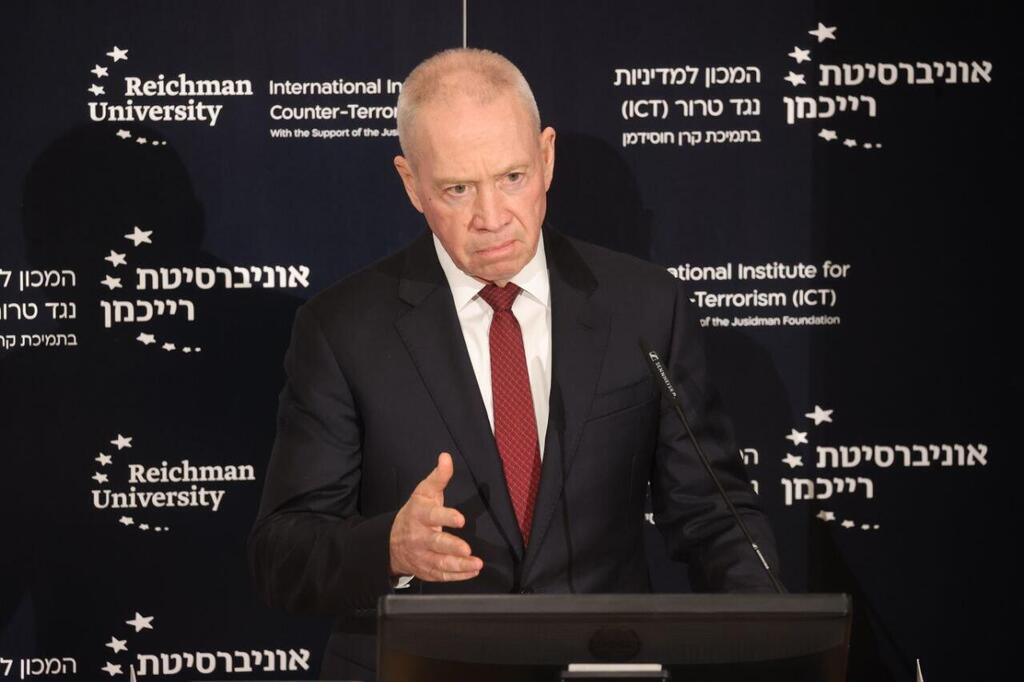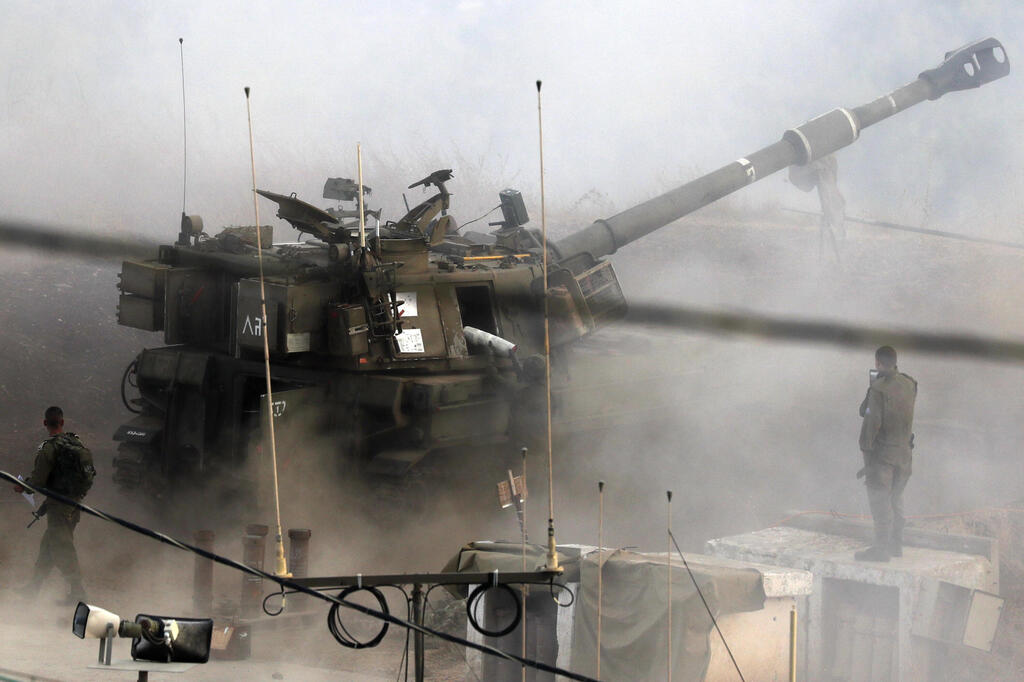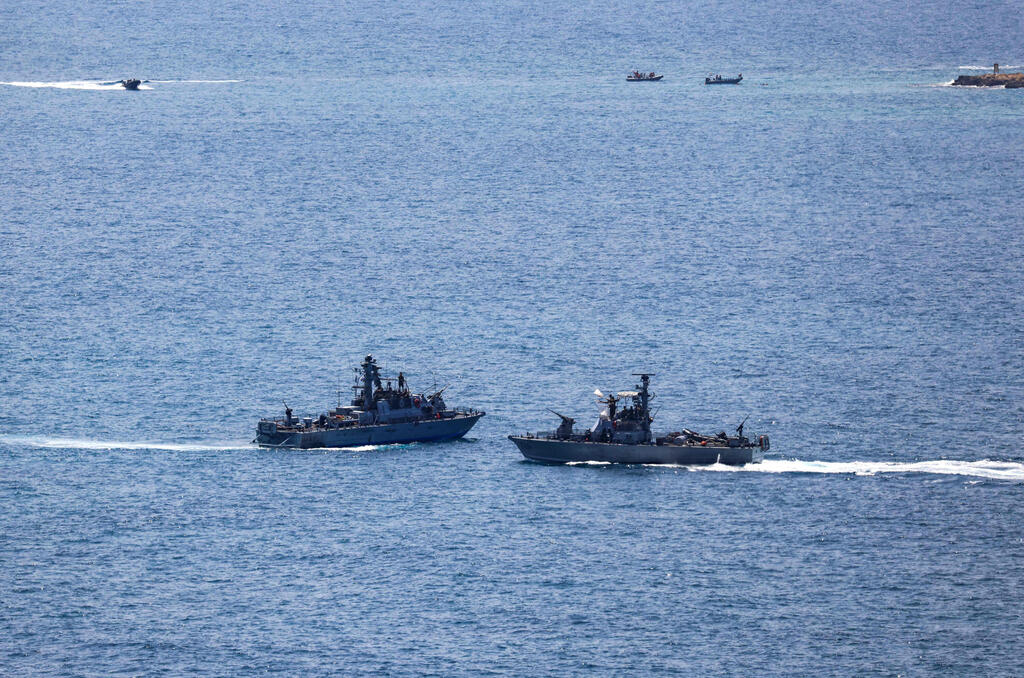In the span of three and a half weeks, two senior Iranians showed up in Beirut and held talks with their proxy— Hezbollah Secretary-General Hassan Nasrallah.
Read more:
In between those high-ranking visits an Iranian parliamentary delegation led by the Chairman of the National Security and Foreign Policy Committee Wahid Jalalzadeh, which also included Hossein Assadi, the secretary of the National Security and Foreign Policy Committee in the Shura Council, arrived in Lebanon on August 10 and, among other activities, held a meeting with the Hezbollah chief as well.
7 View gallery
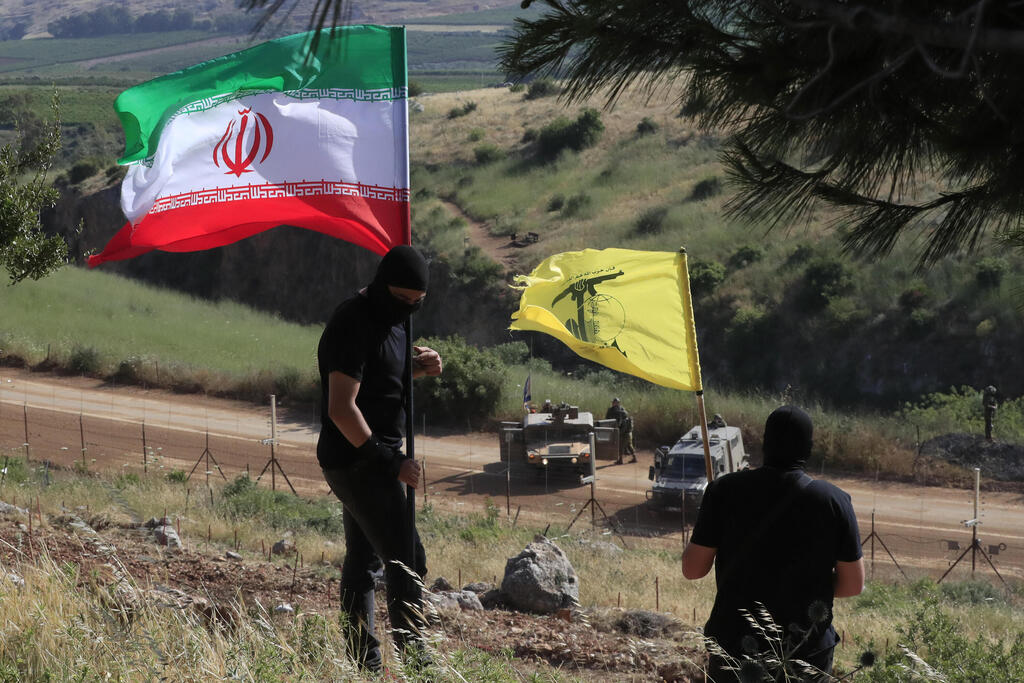

Two men waving the Iranian and Hezbollah flags next to the Israeli border
(Photo: AP)
First to come was Islamic Revolutionary Guards Corps (IRGC) Quds Force Commander Brigadier General Esmail Qaani who arrived on August 6. Right on his heels, on August 31, Iran’s Foreign Minister Hossein Amir-Abdollahian arrived in Lebanon to also meet with Nasrallah.
Israeli government officials have publicly warned that the visits came as part of an Iranian effort to pressure Hezbollah to continue its provocations on the Lebanese border.
For example, Reuters reported that Israeli National Security Adviser Tzachi Hanegbi, in an Aug. 7 media briefing, said Hezbollah was becoming "more and more brazen", speculating that Iran was trying to convince the group "to take more and more risks, and we would be sucked into this conflict even though we don't want any conflict in Lebanon".
Defense Minister Yoav Gallant was even more emphatic. During a meeting in New York in late August, he reportedly told the United Nations Secretary-General Antonio Guterres that Iran was pressing its proxy group Hezbollah to attack Israel along its northern border.
These warnings, however, are likely to be off the mark. In fact, at best they may be motivated by both domestic and international political considerations. At worst, they may reflect a profound misunderstanding of the increasingly effective strategy Iran is pursuing to accomplish its deadly goals, and the acute danger it is already posing to Israel.
First, the question must be asked: Why would Iran need to send senior officials to pressure Nasrallah to continue provocations? In the past few months, the Hezbollah chief showed ample signs he was highly motivated to act to humiliate and intimidate Israel.
Undoubtedly, he assesses that pressing Israel is helping him domestically by solidifying his image as the preeminent protector of Lebanon’s territorial rights. Thus the question must be asked: What did the mullahs detect that gave them an inkling Nasrallah is about to change course and needs reminding of his wholesale dependence on Tehran so as to submit to its demands?
Second, Iran must take into account that Hezbollah might be severely damaged in a confrontation with Israel, even in a short-lived one. It is uncertain how Iran assesses the probability of an Israeli preemptive attack currently.
Although it can be argued that in view of the internal crisis in Israel, it may see such an attack as less likely, the opposite is also possible. Namely, the mullahs may fear that Netanyahu’s incentive to attack is greater now as a means to export his domestic troubles and unite a divided nation. Moreover, Iran is now closer than ever to crossing the nuclear threshold — a transformation which, in theory at least, inevitably raises the odds of an Israeli attack.
7 View gallery
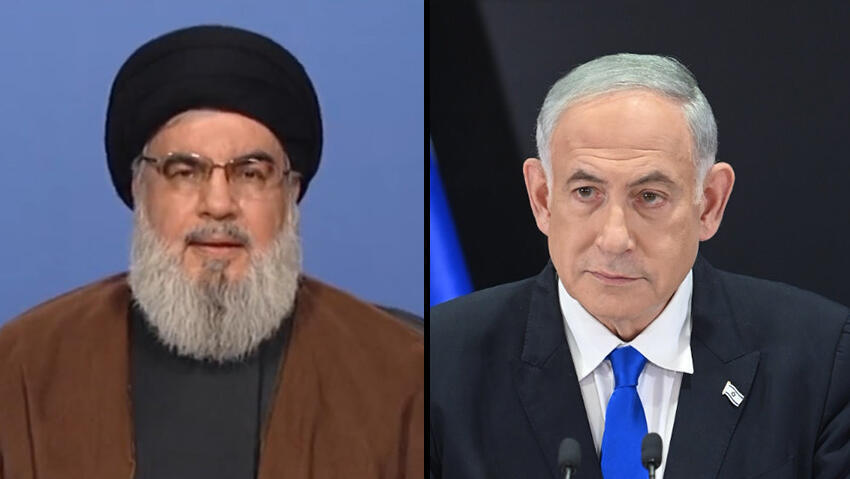

Hezbollah Secretary-General Hassan Nasrallah and Prime Minister Benjamin Netanyahu
(Photo: Yair Sagi)
At any rate, Iran’s unceasing efforts to arm Hezbollah, in particular the upgrading of the latter’s arsenal of precision-guided rockets and suicide drones, strongly indicates it continues to see the organization as a strategic deterrent vis-a-vis Israel.
A confrontation with Israel that ends up destroying critical elements of Hezbollah’s ability to strike Israel’s strategic targets will be disastrous for Iran. As Ron Ben-Yishai, the defense correspondent for Yedioth Ahronoth and Ynetnews wrote on July 31, such an outcome “ will deprive Iran of the ‘second strike’ force which Hezbollah [through its rockets arsenal] was meant to provide so as to punish Israel in case it attacked Iran’s nuclear installations….instead of Hezbollah aiding Iran [in its time of need] Iran would need to come to Hezbollah’s aid.”
By assuring punishment, Hezbollah performs as another layer of Iranian deterrence vis-a-vis Israel and risking a substantial portion of its arsenal for a few days of fighting with Israel undoubtedly makes little sense for Tehran.
Third, how would an Israeli-Hezbollah flareup serve Iranian interests if indeed a ( mini) nuclear deal between Tehran and Washington is in the works? While it is possible to argue that Iran may see such a scenario as piling pressure on the Biden administration to reach an agreement, it is equally possible that such a course will backfire and make such an understanding even more unlikely than it is currently assessed.
One thing is certain Iran could not see the recent beefing-up of U.S. forces in the Persian Gulf as the outcome it was hoping for in response to its growing regional assertiveness.
Fourth, and most importantly, Iran is working tirelessly to develop options to continuously harass and destabilize Israel without putting its prized strategic possession—Hezbollah—in jeopardy. Indeed the Iranian strategy vis-a-vis Israel is an extension of its general approach to spreading its influence in the Middle East. It is based on developing multiple options to conduct offensive operations indirectly—i.e. through proxies. By cultivating numerous surrogates Tehran acquires flexibility of means to seize and maintain the strategic initiative and aggressively pursue its grand scheme of dominating the region while minimizing the risk to itself.
Thus, Iran has significantly amped its support for the Gaza-based Palestinian terror organizations Hamas and the Palestinian Islamic Jihad (PIJ). Directly, and increasingly through Hezbollah, Tehran is providing funds, arms, explosives and guidance to these organizations with the aim of developing multiple inter-connected fronts to tie together combatants in Gaza, the West Bank and Lebanon (and possibly Syria).
It hopes that via upgraded arsenals, collaborative operational planning and intelligence sharing these fronts unify so as to engage in joint actions to sap Israeli military energies and in time represent a credible threat to the country’s staying power and continued existence.
Tehran's blue-eyed boy
Until such time, Iran expects these groups to pursue an unrelenting terror campaign to create upheaval inside Israel. The mullahs figured out that the more is Jerusalem preoccupied with internal security, the less will it be able to deal with Iran.
7 View gallery
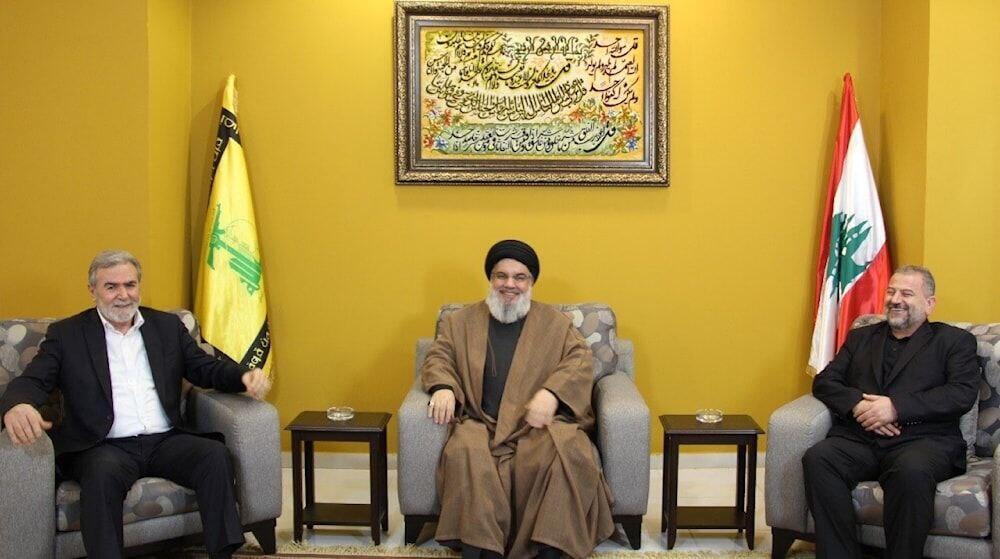

Nasrallah (center) meets with PIJ Secretary-General Ziyad al-Nakhalah (left) and Hamas politburo deputy chief Saleh Al-Arouri in Beirut
For example, in early September Nasrallah met with PIJ Secretary-General Ziyad al-Nakhalah and Hamas politburo deputy chief Saleh Al-Arouri in Beirut. A statement released on the occasion said the groups reiterated their “permanent and firm position” toward the fight “against the Zionist enemy, toward the occupation, and toward the importance of coordination and daily contact between the resistance movements — especially in the Palestinian territories and Lebanon.”
Most alarming is the heightened attention Iran is putting on fostering another, internal, front inside Israel itself by pressing its Arab population to join the ranks of the “resistance.” By spreading fake news daily, Iranian cyber attacks seek to incite and inflame local Arabs to take up arms, as well as to exploit and widen the divisions within Israeli society. Tehran has also sought to recruit Israeli Arabs directly to gather intelligence and engage in sabotage operations.
Additionally, Iran is fully invested in efforts to smuggle weapons and high-grade explosives into Israel through Hezbollah and the Palestinian terror organizations. At times these shipments are destined for Arab Israeli criminal gangs with the goal of fanning havoc domestically. Yet such well-armed groups also pose a potential threat to the IDF’s internal mobilization and logistic lines— a scenario that has already forced Israel to plan for interruptions of its military preparations during a multi-front war.
The importance of this element in Iran’s “unity of fronts” strategy was recently on full display. On September 3, Hamas politburo head Ismail Haniyeh issued an unusual statement accusing Israel of orchestrating the violent crime epidemic afflicting the Israeli Arab community lately and tacitly calling on them to stop killing each other instead of turning their weapons on their "Zionist occupiers."
It said “We hold the Zionist occupation responsible for the blood and the murders running wild inside the lands of 1948… The security arms of the Zionist enemy play a dangerous role that aims to engage our people in another struggle to forget their religious and historical ties to the Palestinian people in Gaza, the West Bank and in exile.”
7 View gallery
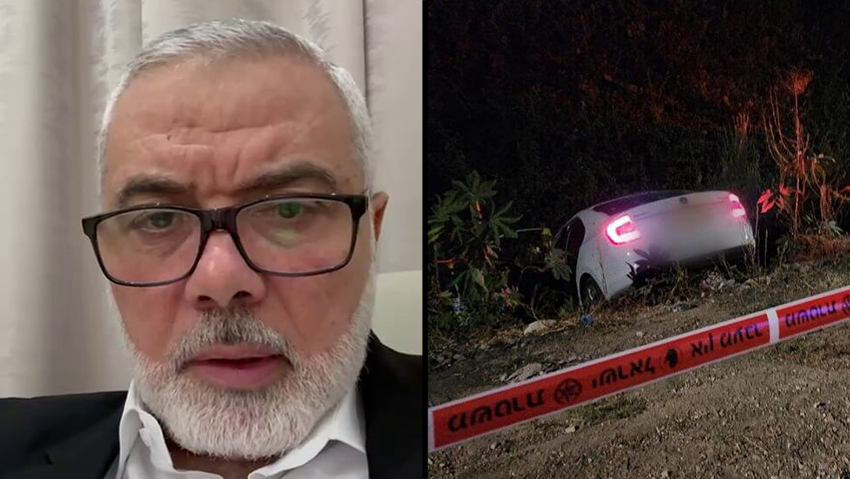

Hamas politburo head Ismail Haniyeh; scene of murder in Arab community
(Photo: Israel Police)
Based on the above analysis the conclusion seems warranted that the Iranians’ visits were meant to urge Nasrallah to “cool it” insofar as confronting Israel directly. An escalation leading to an Israeli-Hezbollah armed clash, let alone war, is not in Iran’s interest presently.
At the same time, Tehran undoubtedly pressed Hezbollah to focus instead on advancing its increasingly effective strategy of “uniting the fronts” — i.e., intensify its promotion of the Palestinian terror organizations’ “resistance“ operations as well as boosting its efforts to spark off a domestic front inside Israel by mobilizing Israeli Arabs as a critical link in a “ring of fire” aimed to consume the Jewish state.
Iran thus accomplishes two objectives — it puts the breaks on the rapidly increasing chances of an Israeli-Hezbollah confrontation, and thus safeguards the latter’s role as a strategic deterrent, while simultaneously escalating the war Israel’s other enemies are waging.
No wonder that in the wake of Iran’s “laying down the law” to Nasrallah, Israeli media was able to report that the frictions along the northern border had abated. For example, media reports said that Hezbollah has stopped on August 12 consistently manning the tent that was set up in Israeli territory opposite Har Dov about, 50 meters from the border with Lebanon.
“This is a change from the last few months in which the tent was manned 24/7 and shifts were carried out by armed Hezbollah terrorists,” the paper said.
Likewise, on August 30, it was reported that “in the past two weeks Israeli defense authorities have noticed an easing of tensions and a decrease in the scope of provocations carried by Hezbollah on the border [with Israel] with the senior echelons [of the organization] exercising tighter controls on developments in the field and [warding off] local initiatives by field commanders.”
Hezbollah is an Iranian strategic asset of the first degree and the mullahs are not about to waste it for a minor engagement that will have little lasting impact on Israel but could cost the organization dearly in terms of losing key elements of its arsenal. This stockpile took years to amass and untold fortunes to acquire.
Importantly, however, Iran’s determination to preserve Hezbollah intact so it can perpetuate its role as a strategic deterrent strongly suggests an unwavering commitment to acquire a nuclear weapons capability.
Finally, Iran’s cultivation of proxies to pursue an aggressive strategy is designed to shield it from risk. Yet the hurried visits of its officials to Lebanon indicate the mullahs were forced to relearn the lesson of the 2006 Israel-Hezbollah war—controlling surrogates could be a tall order and lead to unintended, even disastrous, consequences for the string-puller not to mention the proxy itself.
Dr. Avigdor Haselkorn is a strategic analyst and the author of books, articles and op-eds on national security issues.


